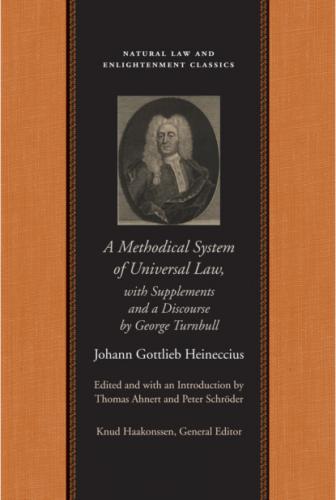Thomas Ahnert
Peter Schröder
The present edition is based on the text of the 1741 London edition, which was a translation of the first edition, published in Latin, in Halle, in 1738.
Heineccius’s and Turnbull’s notes are indicated by asterisks, daggers, and single square brackets; editorial notes within original notes are contained within double square brackets. All other new editorial notes and references are indicated by arabic numerals. The “Remarks” sections at the end of some chapters are by Turnbull.
The original references by Johann Gottlieb Heineccius and George Turnbull are often incomplete or inaccurate. We have therefore provided the full title when a work is first mentioned by Heineccius or Turnbull, though it is not always possible to determine the precise editions they used. In the case of classical authors we refer to modern editions, unless indicated otherwise in the notes. Full publication details for works cited in the notes are provided in the bibliography to the extent that this has been possible. The exact sources of quotations and paraphrases are identified whenever possible. References to Roman civil law and the Bible are not explained in the footnotes, unless there are specific reasons for doing so. The archaic spelling of the 1741 text has been retained, though printer’s errors have been silently corrected. Page breaks in the original text are indicated by the use of angle brackets. For example, page 112 begins after <112>.
A general note on references to Roman law: Roman civil law, the Corpus Iuris Civilis, includes the Digest, the Code of Justinian, and the Institutes. In references these texts are abbreviated as “D.,” “C.,” and “Inst.,” respectively. The rest of the reference is to the relevant book and title of a law—“1. 24. D. de ritu nupt.,” for example, refers to the laws on the rites of marriage (“de ritu nuptiarum”) in book 24 of the Digest.
We are very grateful to Knud Haakonssen for his invitation to contribute this volume to the Natural Law and Enlightenment Classics series and for his advice and support. We are also much indebted to a number of friends and colleagues for their help and encouragement and should like to thank Antony Hatzistavrou and Jenny Gibbon, in particular, for their help in identifying the sources of some Greek quotations.
A METHODICAL SYSTEM
OF
Universal Law:
OR, THE
LAWS of NATURE and NATIONS
DEDUCED
From CERTAIN PRINCIPLES, and applied
to PROPER CASES.
Written in Latin by the CELEBRATED
JO. GOT. HEINECCIUS,
Counsellor of State to the King of Prussia,
and Professor of PHILOSOPHY at Hall.
Translated, and illustrated with Notes and Supplements,
By GEORGE TURNBULL, LL. D.
To which is added,
A DISCOURSE upon the Nature and Origine of MORAL and CIVIL LAWS; in which they are deduced, by an Analysis of the Human Mind in the experimental Way, from our internal Principles and Dispositions.
Natura enim juris ab hominis repetenda natura est.1 CIC.
VOL. I.
LONDON:
Printed for J. NOON, at the White-Hart, near Mercer’s Chapel, Cheapside. MDCCXLI.
TO
His ROYAL HIGHNESS,
WILLIAM
Duke of Cumberland,
This TRANSLATION of
A System of the Law of NATURE and NATIONS, Written in Latin by the celebrated Jo. Got. Heineccius, Counsellor of State to the late King of Prussia, and Professor of Philosophy at Hall: With the Supplements and Discourses added to it,
Is most humbly dedicated,
In Veneration of His ROYAL HIGHNESS’s many great and amiable Qualities, so becoming His high Birth and exalted Rank, the suitable Care bestowed upon His Education, and the Royal Example He has daily before His Eyes, of true Greatness, and the best Use of Power,
By His ROYAL HIGHNESS’s
most devoted and
most obedient Servant,
GEORGE TURNBULL.
PREFACE
The author of this system of the law of nature and nations is so well known, and in so high esteem in the republic of letters, that it would be arrogance in me to say any thing in recommendation of his works. Nor need I make any apology for translating into our language so excellent a book upon a subject of such universal importance. For the knowledge of justice and equity must be owned to be necessary in some degree to every one; but to those, in a particular manner, whose birth and fortunes afford them time and means, and call upon them to qualify themselves for the higher stations in civil society. Man, and the rights and duties of man, are certainly the most proper objects of human study in general. And surely Socrates had reason to say, “That if no man can be fit to undertake a trade, how mean and mechanical soever, without having been educated to it, and bestowed some considerable time upon the learning of it, it must be absurd to think one can be qualified for discharging public trusts and duties, without having taken great pains to instruct themselves in the principles of equity, the ends and interests of civil society, and the nature, spirit, and intention of laws.” I shall only add, that every science hath its elements; and this treatise at least well deserves to be called an excellent introduction to the science of laws. As for the notes and supplements I have added, how far they are necessary, I must leave it to the reader to judge. The greater part of them relates to one question, viz. The origine of civil government, which hath not been set in its true light by any other writer besides him from whom the illustration of this point is here borrowed. The discourse upon the origine and nature of laws,
